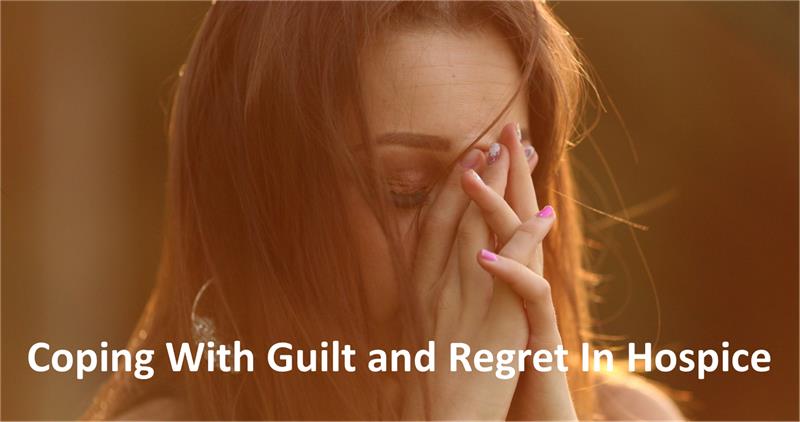“If only I had noticed the symptoms sooner.” “I should have brought him to the doctor earlier.” “I promised I’d never put her in a hospital, but last month I had to.” “I was impatient with him yesterday when he asked the same question repeatedly.”
These thoughts haunted Rebecca as she sat by her husband’s bedside in their West Jordan home. Despite the compassionate hospice care he was receiving, despite her unwavering presence through his illness, feelings of guilt and regret had become her constant companions. She wondered if she was alone in experiencing these emotions.
She wasn’t. And neither are you.
Understanding Guilt and Regret During End-of-Life Care
Guilt and regret are among the most common—yet least discussed—emotions experienced by family members during hospice care. Throughout the Wasatch Front, caregivers from all walks of life find themselves wrestling with these feelings, often silently.
These emotions can take many forms:
- Guilt over past relationships or unresolved conflicts
- Regret about treatment decisions or timing
- Self-criticism about moments of impatience or frustration
- Guilt about feeling occasional relief when considering an end to suffering
- Regret for promises that couldn’t ultimately be kept
- <liGuilt over not being able to prevent suffering
The Hidden Truth About Caregiver Guilt
Here’s what our Inspiration Hospice team wants every caregiver to know: These feelings of guilt and regret, while painful, are normal human responses to extraordinarily difficult circumstances.
When James, one of our social workers, sits with families in their Provo or Bountiful homes, he often shares this perspective: “The very fact that you’re concerned about having done enough shows how deeply you care. Perfect caregiving isn’t possible because perfect humans aren’t possible. The measure of your love isn’t perfection—it’s your continued presence and effort despite the challenges.”
Practical Strategies for Coping with Guilt and Regret
Acknowledge Your Feelings
- Name your specific guilt or regret—bringing it into the light often diminishes its power
- Remember that these emotions are common among even the most devoted caregivers
- Understand that feeling guilty doesn’t mean you’ve actually done something wrong
Practice Self-Compassion
- Speak to yourself with the kindness you would offer a friend in your situation
- Remember the countless things you’ve done right in your caregiving journey
- Recognize the extraordinary circumstances and pressures you’re under
Share Your Feelings
- Talk with a trusted friend who can offer perspective
- Consider speaking with a hospice social worker or chaplain
- Join a caregiver support group where others understand similar feelings
Find Ways to Address Regrets When Possible
- Have important conversations while there’s still time
- Create meaningful moments of connection now
- Focus on what you can control in the present moment
How Inspiration Hospice Helps Families Navigate These Emotions
Our comprehensive approach includes support specifically for these difficult feelings:
Professional Guidance
Our social workers are skilled in helping caregivers process guilt and regret. They offer both practical strategies and a non-judgmental space to express feelings that may seem unacceptable elsewhere.
Facilitated Conversations
Sometimes, important words remain unspoken between family members. Our team can help facilitate healing conversations that address long-held regrets when appropriate.
Spiritual Support
Our chaplains provide spiritual care that can help address deeper questions about forgiveness, meaning, and reconciliation—whether with others, oneself, or in one’s faith tradition.
Bereavement Support
We understand that guilt and regret often intensify after a loss. Our bereavement program includes specific support for working through these emotions.
Finding Peace: Rebecca’s Journey
Over time, with support from her Inspiration Hospice team, Rebecca began to view her caregiving journey differently. “I started keeping a daily journal of the loving things I did for David each day—the back rubs, the favorite meals I prepared, the photo albums we looked through together,” she shared. “It helped me see that while I wasn’t a perfect caregiver, I was a deeply loving one.”
Rebecca also found comfort in a conversation with David, facilitated by their hospice social worker, where she was able to express her regrets about not recognizing his symptoms sooner. “His forgiveness was immediate and complete,” she recalled. “He reminded me of all the ways I had supported him throughout our marriage, not just during his illness.”
The Path Forward
If you’re struggling with guilt or regret while caring for a loved one in hospice, please know that addressing these feelings is an important part of your wellbeing—and ultimately benefits both you and your loved one.
The compassionate team at Inspiration Hospice understands the complex emotional landscape of end-of-life care. Throughout the Wasatch Front, our staff brings not only medical expertise but also the emotional and spiritual support needed to help families find peace amid difficult circumstances.
You don’t have to carry the burden of guilt and regret alone. Contact us at (385) 247-2020 or visit www.inspirationhospice.com to learn how our team can support you through every aspect of the hospice journey—including the emotional challenges that are seldom discussed but deeply felt.

